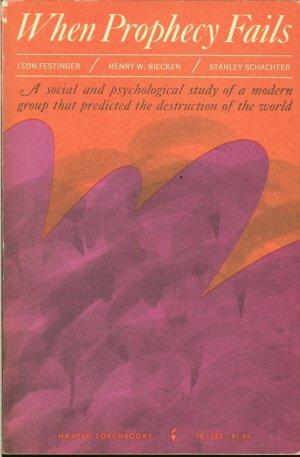Paperback, 253 pages
English language
Published Dec. 13, 1967 by Harper & Row.
A Social and Psychological Study of A Modern Group that Predicted the Destriction of the World Harper torchbooks

Paperback, 253 pages
English language
Published Dec. 13, 1967 by Harper & Row.
In 1954 Leon Festinger, a brilliant young experimental social psychologist in the process of outlining a new theory of human behavior - the theory of cognitive dissonance - and his colleagues infiltrated a cult who believed the end of the world was only months away. How would these people feel when their prophecy remained unfulfilled? Would they admit the error of their prediction, or would they readjust their reality to make sense of the new circumstances?
"We've all experienced the futility of trying to change a strong conviction, especially if the convinced person has some investment in his belief. We're familiar with the variety of ingenious defenses with which people protect their convictions, managing to keep them unscathed thru the most devastating attacks. But human resourcefulness goes beyond simply protecting a belief. Suppose an individual believes something with a whole heart; suppose further a commitment to this belief, suppose irrevocable …
In 1954 Leon Festinger, a brilliant young experimental social psychologist in the process of outlining a new theory of human behavior - the theory of cognitive dissonance - and his colleagues infiltrated a cult who believed the end of the world was only months away. How would these people feel when their prophecy remained unfulfilled? Would they admit the error of their prediction, or would they readjust their reality to make sense of the new circumstances?
"We've all experienced the futility of trying to change a strong conviction, especially if the convinced person has some investment in his belief. We're familiar with the variety of ingenious defenses with which people protect their convictions, managing to keep them unscathed thru the most devastating attacks. But human resourcefulness goes beyond simply protecting a belief. Suppose an individual believes something with a whole heart; suppose further a commitment to this belief, suppose irrevocable actions have been taken because of it; finally, suppose evidence, unequivocal and undeniable evidence, that the belief is wrong: what will happen? The individual will frequently emerge, not only unshaken, but even more convinced of the truth of such beliefs than ever before. Indeed, s/he may even show a new fervor about convincing and converting others to this view. How and why does such a response to contradictory evidence come about? This is the question on which this book focuses. We hope that, by the end of the volume, we will have provided an adequate answer to the question, an answer documented by data."
When Prophecy Fails is a classic text in social psychology authored by L. Festinger, H. Riecken and S. Schachter. It chronicles the experience of a UFO cult that believed the end of the world was at hand. In effect, it's a sociopsychological study of a modern group that predicted the destruction of the world & the adjustments made when the prediction failed to materialize.
"The authors have done something as laudable as it is unusual for social psychologists. They espied a fleeting social movement important to a line of research they were interested in and took after it. They recruited a team of observers, joined the movement & watched it from within under great difficulties until its crisis came and went. Their report is of interest as much for the method as for the substance."--Everett C. Hughes, The American Journal of Sociology.